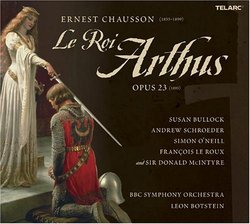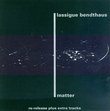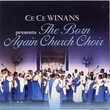| All Artists: Ernest Chausson, Leon Botstein, BBC Symphony Orchestra, Susan Bullock, Andrew Schroeder, Simon O'Neill, François Le Roux, Donald McIntyre, Michael Bundy, Daniel Okulitch Title: Chausson - Le Roi Arthus Members Wishing: 0 Total Copies: 0 Label: Telarc Original Release Date: 1/1/2005 Re-Release Date: 7/26/2005 Genre: Classical Styles: Opera & Classical Vocal, Historical Periods, Modern, 20th, & 21st Century Number of Discs: 3 SwapaCD Credits: 3 UPC: 089408064524 |
Search - Ernest Chausson, Leon Botstein, BBC Symphony Orchestra :: Chausson - Le Roi Arthus
 | Ernest Chausson, Leon Botstein, BBC Symphony Orchestra Chausson - Le Roi Arthus Genre: Classical
|
Larger Image |
CD DetailsSimilar CDs
|
CD ReviewsAs Botstein and his forces demonstrate, Chausson's opera goe David A. Hollingsworth | Washington, DC USA | 01/29/2006 (5 out of 5 stars) "When writing "Le Roi Arthus" during an almost ten years span (1886-1895), Ernest Chausson was one of many who had both the fortunes and the misfortunes of being under Wagner's enormous spell. Richard Wagner was a progressive, revolutionary musical genius whom many composers learned from. But establishing one's musical identity in the midst of being under Wagner's influence proved to be a difficult, sometimes even onerous task, and it is a matter of degree in ingenuity, talent, and even training that can dictate a certain degree of freshness and genius versus derivations and less-than sure footedness. Even politics and circumstances had effects of a musical artist finding his/her way. Hence, it took years for Bruckner to shed much of his Wagner leanings to write music of remarkable transcendental qualities that is clearly his own. But composers like Engelbert Humperdinck and Wagner's son Siegfried were not entirely so lucky and consequently their works suffer from qualities that are not so longlasting in value. Chausson's opera in three acts shows so much of a genius this composer could be. His leanings towards Wagner are evident, but much of the work is individual in character. The prelude is by itself promising in that regard (and much of it is indeed well-fulfilled). But the neglect of the work was more historical and political than the qualities it possesses. France during the 19th century was struggling with its fondness toward Wagner (and particularly his Tannhauser, which shook France by its foundations after the 1861 Paris production of the opera) and the need to establish its musical identity. Massenet, Debussy, Franck, and later Faure gave France a much needed answer to its struggle for such an identity. However, works that lean towards the German master were neglected, and Chausson (as well as Dukas in his Ariane et Barbe-bleue of 1907 and Lalo in Le Roi d'Ys) suffered as a result. As Leon Botstein notes in his revealing booklet essay, the matter remains largely unresolved long after the 1903 premiere of `Arthus.' The aforementioned conflict evidently affected Ernest Chausson as he was composing "Le Roi Arthus". An extremely well-read and a well-versed musical artist in his own right, Chausson confessed to Claude Debussy, who was beginning to compose "Pelleas et Melisande," of his struggles to overcoming Wagner's influence (something Debussy was dealing with as well). The subject matter was a problematic one for Chausson as was the composition of the music. The love between Lancelot and Genievre derives much from Wagner's "Tristan und Isolde." But, for Chausson, love should go beyond the superficiality. In reading Steven Heubner's booklet essay, Chausson writes in his diary that what is called love is the desire for self-centured pleasure. Love, according to the composer, must be more than that. It must be resplendent (or glowing), trancendental in quality: the quality of mankind where one must give oneself absolutely and totally (hence the word loyalty). Lancelot's love for Genievre is in a constant struggle with his loyalty for King Arthus. There's really nothing effasive and elusive in Chausson's tackling of this issue. His treatment in the conflict is straitforward as it is compelling. The first act (scene III) spells out the love between Lancelot and Genievre, with Mordred, a nephew of the King, vowing revenge against them for he too is in love with her. For me, however, the second act is the most gripping of the opera. It is where Lancelot (unlike Tristan) is filled with a sense of guilt and remorse for betraying the King (as he confesses this to the Plowman), while Guinevere is ignobly concerned only with saving her reputation after being denounced by Mordred: their tense, white-hot emotions are expressed in passionate paragraphs, exciting musical passages, and compelling orchestration that owes much to Wagner as to Chausson himself. This opera is well above the superficiality and the cheapness that so many had claimed it to be after its 1903 posthumous premiere in Brussels, Belgium. Performances, recording, and the overall presentation are all-round immaculate and imaginative throughout. Susan Bullock sings the role of Genievre ardently and with pure passion. Her voice may not be as piercing as the late Birgit Nilsson of Isolde, but commanding and artistic nevertheless. Her theatrical portrayal of Genievre's anguish and frustration in scene III of Act II is well brought out in many ways that are beyond the studio-bound performance and she brings a sort of madness to her role particularly towards the end of scene two of Act III (in a midst of a battle between Lancelot and Le Roi Arthus). I like Andrew Schroeder's Arthus in his in-your-face humanity as the King. But Simon O'Neill's role as Lancelot is as gripping as Bullock in her personification of Genievre. Lancelot's inner and outer conflicts are real and O'Neill brings out the torments that consumes him in ways that perhaps only Manfred can relate to (and imagine what Tchaikovsky would've thought of Chausson's opera had he lived much longer). Francois Le Roux sings Merlin with an appropriate yet appealing level-headedness and the smaller roles are indeed well cast. The BBC Symphony Orchestra and the Apollo Voices are excellent and definitely true to their forms while Botstein continues to be among the best advocates of neglected masterworks. And while "Le Roi Arthus" will not be deemed as a masterpiece in the eyes and ears of many, it is Botstein, with such a gift and ardency in his overall presentation, who would have you think twice (and deeply)." Wagner's French Opera: King Arthur Leo J. Wolansky | 12/30/2007 (5 out of 5 stars) "For all of you Wagnerites who wished the maestro had written one more opera in his later years, your dream has come true...well almost. Ernest Chausson's "Le Roi Arthus" is the closest thing to a Wagner opera as you'll find. Apparently Chausson idolized Wagner and his music. According to John Underwood, after a trip to hear "The Ring", Chausson happened to catch a glimpse of Wagner and for the rest of his life cherished the image of Wagner's "noble head". Needless to say the music of Chausson's only opera reflects the influence of Wagner throughout--in the chromaticism, the harmonies, the deceptive cadences (endless melody), and the primary importance of the orchestra. This is not to say that the work is plagiarism. Chausson is writing in Wagner's musical language. It is only because Wagner's musical language was so revolutionary that anyone using it would sound like an imitator. In fact, Debussy, Chausson's friend, criticized it for being too Wagnerian and made several musical suggestions to Chausson, which he incorporated, so that when Debussy's Pelleas was completed, there were some passages in common with "Arthus". Apart from the overture and finale which are somewhat corny, the opera is fabulous. The love duet/scene at the end of act one between Lancelot and Guenievre (French for Guinevere) is stunning. It is for this scene specifically that this Armin Jordan "Arthus" is strongly recommended over this Leon Botstein recording. In the Jordan recording, Teresa Zylis-Gara was in her prime and has a rich sumptuous sound from each hair-raising forte to each delicate pianissimo. Susan Bullock's portrayal on the Botstein recording demonstrates good musicality but the overall performance is flawed by her vibrato, which is often unacceptably slow for my taste. Simon O'Neill of this recording and Gosta Winbergh of the Jordan recording are both very good as Lancelot. Andrew Schroeder of this recording has a very appealing instrument and portrays Arthus very effectively. Gino Quilico on the Jordan recording has a less rich voice but is more emotional as the agonized King. This is particularly true of his Act 2 soliloquy where he laments his suspicions of Lancelot. Gilles Cachemaille on the Jordan recording is superb as Merlin, somewhat better than Francois Le Roux of this recording. The opera is filled with haunting orchestral passages such as the introduction to Act 1 Scene 2 which preceded the soliloquy of Lyonnel, Lancelot's loyal friend who keeps watch with trepidation as Lancelot has his rendezvous with Guenievre. Vocally, Garret Sorenson on this recording has a much nicer sound than Gerard Friedmann, the Lyonnel of the Jordan recording although both are able to convey the beauty of the music. Another orchestral gem is the Prelude to Act 2, which is performed magnificently on both recordings. This is followed by the song of the ploughman / laboureur. The slow tempo taken by Andrew Kennedy on this recording better maintains the contemplative, mournful mood. In conclusion, if you wish that Wagner had written another opera along the lines of Parsifal and "Tristan" (with a hint of Debussy) you need to have this opera. If the Armin Jordan recording is unavailable then get this one. " ANOTHER FRENCH MASTERPIECE Alfredo R. Villanueva | New York, NY United States | 05/23/2008 (5 out of 5 stars) "I HAVE NOT HEARD THE OTHER RECORDING OF THIS OPERA, SO I HAVE TO JUDGE IT ON ITS MERITS. FOR A BRITISH RECORDING WITH AN AMERICAN DIRECTOR AND AMERICAN AND BRITISH SINGERS FOR THE MOST PART, IT SOUNDS AMAZINGLY IDIOMATIC. SIMON O'NEILL'S LANCELOT IS OUTSTANDING, AND SO IS BOTSTEIN'S CONDUCTING. BUT THAT IS NOT TO SAY THAT BULLOCK AND LE ROUX ARE LESS IMPRESSIVE. A BEAUTIFUL RECORDING OF A NEGLECTED PIECE."
|

 Track Listings (5) - Disc #1
Track Listings (5) - Disc #1

